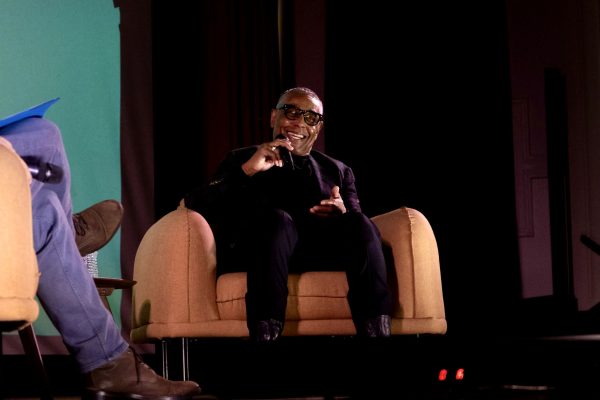Throughout his interview at McAllister Auditorium hosted by Tulane University Campus Programming, the critically acclaimed actor, producer and director Giancarlo Esposito shared insights into not only his career journey but also his journey of personal growth and self-empowerment. Esposito, who has portrayed characters ranging from antiheroes like Gus Fring from “Breaking Bad” to Stan Edgar from “The Boys,” has the unique talent of incorporating his own life experiences and artistic visions into each of his roles.
A search for identity
Born in Copenhagen and raised in Italy, Esposito had an atypical childhood. His mother was a Black opera singer and his father was born and raised in Italy. His mother spent years touring around Europe, so Esposito grew up surrounded by music, poetry and theater. However, his family moved to New York City in the early 1960s, where he first experienced intense racism. He recalled being made fun of and ostracized for his curly hair and biracial appearance. Esposito highlighted his move to New York as the first time he questioned his identity, especially because he lived in Yonkers, New York, at the time of the Getty Square Riots. He credited his struggle to fit into either the Black or white communities with his ability to understand and relate to multidimensional characters and villains. The complexity of villains who are not defined by a single trait is what initially drew him to acting.

Self-empowerment through theater
A television advertisement featuring a Black actor inspired Esposito to audition for commercials and Broadway shows. At his first audition, Esposito sang “Happy Birthday” in a shy tone, fearful of his older brother watching him. He described this moment of vulnerability as the moment where he was able to find his inner power. “The person who is able to empower you the most is you,” Esposito said. This revelation led Esposito to pursue the career he has today. He recounted the time when his role in the Broadway show “Merrily We Roll Along” was shut down after only 16 performances and described this “flop” as a crucial part of his journey towards internal validation.
Heroes vs. villains: The dichotomy of Gus Fring
Gus Fring, the drug lord from the critically acclaimed TV show “Breaking Bad,” is renowned for being one of the most unsettling, controlled villains. Yet for Esposito, Fring was never just a villain. He explored the concept of an antihero as a much more complex character, which attracted him to the role of Gus. “An antihero is a fallen hero,” he said. “There is something about them that is unfulfilled, and they seem fuller than a lot of the good guy characters.”
Instead of portraying a stereotypical bad guy, Esposito strived to give Gus an unspoken backstory and hidden vulnerability. He explained that he wanted to create a backstory “in between the lines” of the script, which is why Gus is one of the most mysterious and feared characters in “Breaking Bad.”
Although he is known for being a drug-running murderer, the most interesting aspect of Gus is not his evil side but his human side. While on set, Esposito observed that villains are often their own worst enemies, and compared this to the human experience. “As I mature in my life, I realize I am my own worst enemy,” he said. This concept of self-reflection and empowerment is the defining element of Esposito’s portrayal of his characters and also of his personal life.
Details on ‘The Boys’ and ‘The Mandalorian’: Exploring the role of superheroes
Esposito has roles in both “The Boys” and “The Mandalorian,” in which he expresses the definition of power in different ways. In “The Boys,” he plays Stan Edgar, a mastermind-esque character who is in charge of the pharmaceutical empire responsible for creating superheroes. Stan is not a conventional superhero, as he does not possess “powers,” but his intelligence and control make him just as respected and feared. “He understands the bigger mechanism of the machine politically and economically,” Esposito said. The true fascination about “The Boys,” according to Esposito, is that the show explores human emotions within a world dominated by superheroes. “We are all superheroes; we just forgot how to do it,” he said.
In “The Mandalorian,” Esposito plays Moff Gideon, a feared character who holds the darksaber. He reveals that the Star Wars universe allowed him to tap into his inner child, saying, “as we get older, we forget our dreams.” “The Mandalorian” offered Esposito the opportunity to return to his childhood dreams, which he said he never got to indulge in.
The hero within
The common factor between all of Esposito’s roles is the idea of power. However, for Esposito, power is not obtained from external facets, but from within. Regardless of whether the role is of a hero or villain, Esposito’s characters are all self-empowered, showing that in dark situations, one can always rely on their internal source of strength.
Esposito concluded the interview with a word of advice for Tulane students and artists: “Read everything… cultivate your mind.”
Esposito’s message was not just about how to build a career as an actor, but about how to find your inner power and confront your “inner villain.” We all have the potential to be superheroes.



Leave a Comment